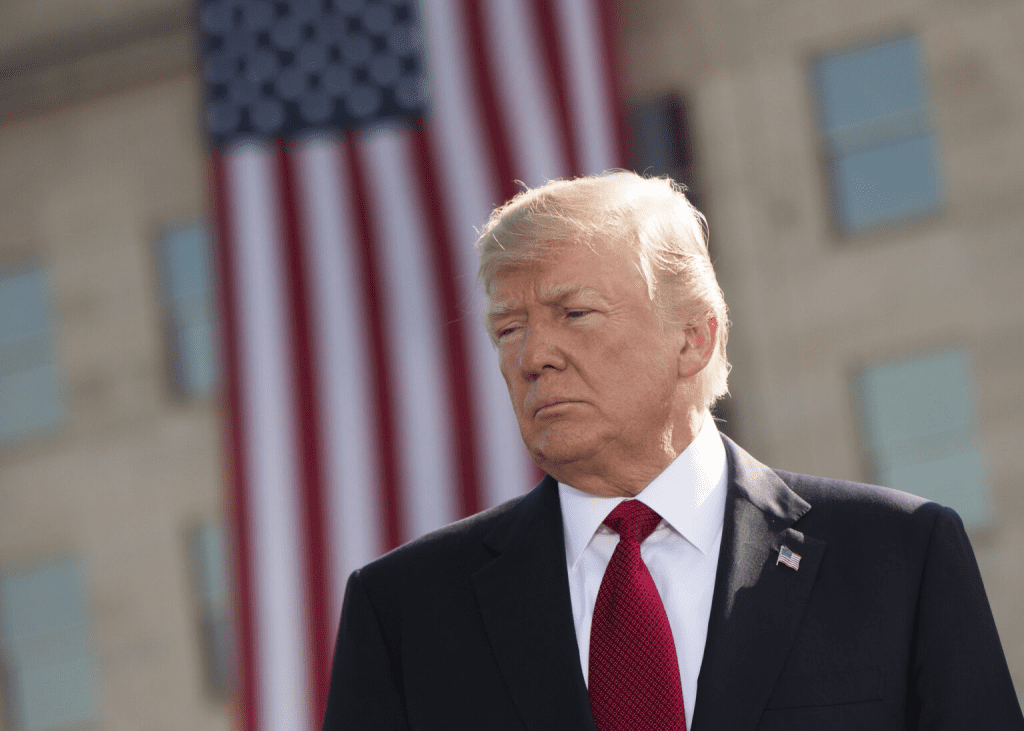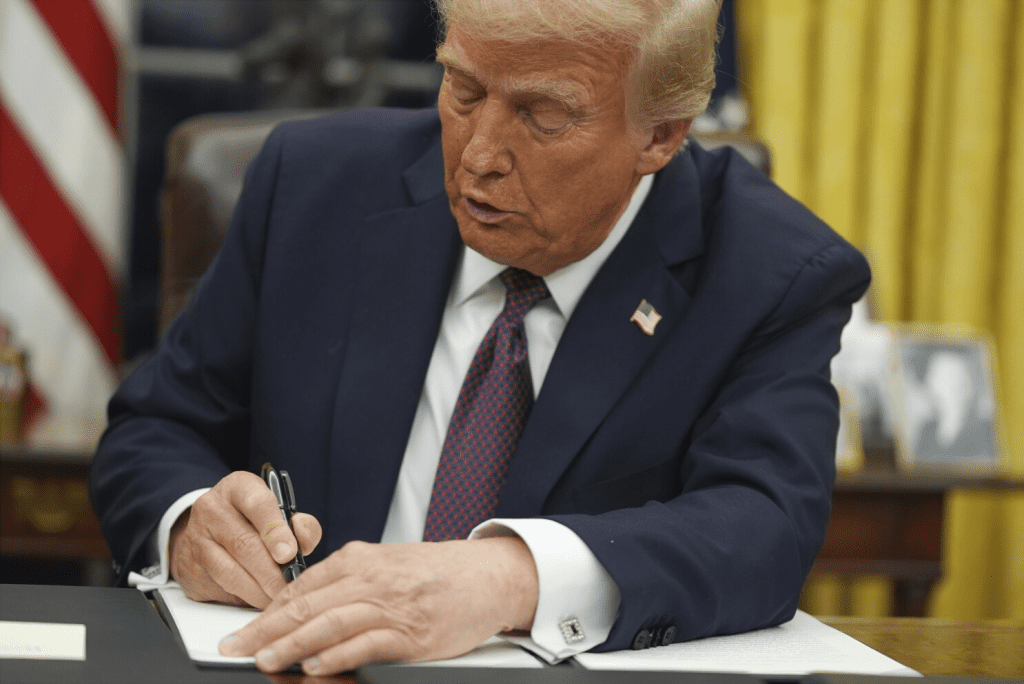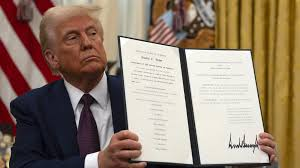Trump’s Controversial Executive Order Sparks Debate
On January 20, Donald Trump took the oath of office as the 47th president of the United States, marking his return to the Oval Office. Among the many executive orders signed in his first days back in power, one of the most controversial targets automatic birthright citizenship. This move has raised numerous questions about its implications, including how it might affect individuals like Trump’s youngest son, Barron Trump.
While the order primarily aims to restrict citizenship rights for children born to undocumented immigrants and temporary visa holders, the broader implications of such a policy remain a subject of heated debate.

What Does Trump’s Executive Order Entail?
The new executive order seeks to end the practice of granting automatic US citizenship to children born on American soil unless at least one parent is either a US citizen or a lawful permanent resident.
Here are the key provisions of the order:
- Eligibility Criteria for Citizenship: Children born in the US will no longer automatically receive citizenship unless one parent meets the criteria for lawful residency or citizenship.
- Restrictions on Federal Documentation: Federal agencies are prohibited from issuing or accepting documents affirming citizenship for affected children within 30 days of the order’s signing.
- Targeted Groups: The policy is primarily aimed at children of undocumented immigrants and those lawfully present in the US on temporary visas.
The order represents a significant shift in the interpretation of the 14th Amendment, which has traditionally been understood to guarantee citizenship to anyone born on US soil, regardless of their parents’ status.
What Does This Mean for Barron Trump?
Barron Trump, born in Manhattan in 2006, is unlikely to be affected by this executive order. His mother, Melania Trump, was a lawful permanent resident with a green card at the time of his birth, making him a US citizen by birth. Additionally, Donald Trump was a natural-born citizen himself, further solidifying Barron’s status under the proposed policy.
Unlike children whose parents do not meet the new criteria, Barron’s citizenship remains secure. However, the broader implications of the order have led to widespread discussions about the legal and moral consequences of such a drastic policy change.
Can Trump Legally End Birthright Citizenship?
The 14th Amendment to the US Constitution explicitly protects birthright citizenship. Its first clause, known as the Citizenship Clause, states:
“All persons born or naturalized in the United States, and subject to the jurisdiction thereof, are citizens of the United States and of the State wherein they reside.”
This language has long been interpreted to grant citizenship to anyone born on US soil, regardless of their parents’ immigration status. Any attempt to revoke or reinterpret this right would face immediate and significant judicial challenges.
Legal experts argue that an executive order cannot override constitutional protections. Amending the Constitution to eliminate birthright citizenship would require approval from two-thirds of both houses of Congress and ratification by three-fourths of state legislatures, a process fraught with political and procedural hurdles.

The Broader Impact of Ending Birthright Citizenship
Trump’s executive order has sparked fierce debate, with supporters and critics weighing in on its potential impact.
Supporters argue:
- It would discourage illegal immigration by removing a significant incentive for undocumented individuals to give birth in the US.
- It could reduce the burden on social services and resources allocated to children of undocumented immigrants.
Critics contend:
- The policy undermines the fundamental principles of equality and inclusion enshrined in the 14th Amendment.
- It could lead to a significant population of stateless children, creating legal and social challenges.
- It sets a dangerous precedent by allowing executive orders to reinterpret constitutional rights.
The proposal has also drawn international attention, as the US has historically been seen as a global leader in extending rights and protections to individuals born within its borders.
Judicial Challenges Loom Ahead
Given the constitutional protections of birthright citizenship, Trump’s executive order is almost certain to face legal challenges. Courts will likely examine whether the president has the authority to reinterpret or restrict rights guaranteed by the Constitution without congressional approval.
If the order is overturned in court, it could further highlight the limitations of executive authority in enacting sweeping policy changes. On the other hand, a protracted legal battle could delay the order’s implementation, leaving affected individuals in a state of uncertainty.

Historical Context of Birthright Citizenship
Birthright citizenship has been a cornerstone of American law since the ratification of the 14th Amendment in 1868. Originally intended to grant citizenship to formerly enslaved individuals and their descendants, the amendment has since been a critical component of US immigration and nationality law.
Throughout history, attempts to restrict birthright citizenship have been met with significant resistance, as the principle is widely viewed as a fundamental aspect of American identity. The current executive order represents the most direct challenge to this principle in modern times.
A Look at Trump’s Broader Policy Agenda
The executive order on birthright citizenship is part of a broader series of policy moves by Trump since his return to the White House. These include:
- Withdrawal from International Agreements: Trump has withdrawn the US from the Paris Climate Agreement and the World Health Organization, signaling a return to his America-first agenda.
- Deferred TikTok Ban: The president temporarily reversed a ban on TikTok, citing the need for further evaluation of national security concerns.
- Sweeping Pardons: Trump issued a significant number of pardons, including those related to the January 6 Capitol riots.
These actions demonstrate a continuation of the controversial and transformative policies that defined Trump’s first term in office.
Conclusion: The Future of Birthright Citizenship
Trump’s executive order targeting birthright citizenship represents one of the most contentious policy moves of his presidency. While Barron Trump’s citizenship is unaffected, the broader implications of such a policy shift could reshape the landscape of American immigration law and constitutional interpretation.
As the nation awaits the inevitable legal challenges, the debate over birthright citizenship serves as a stark reminder of the enduring tensions between executive authority, constitutional rights, and the evolving definition of American identity. Whether this order stands or is overturned, its impact will be felt for years to come, sparking conversations about the balance of power and the core values that define the United States.